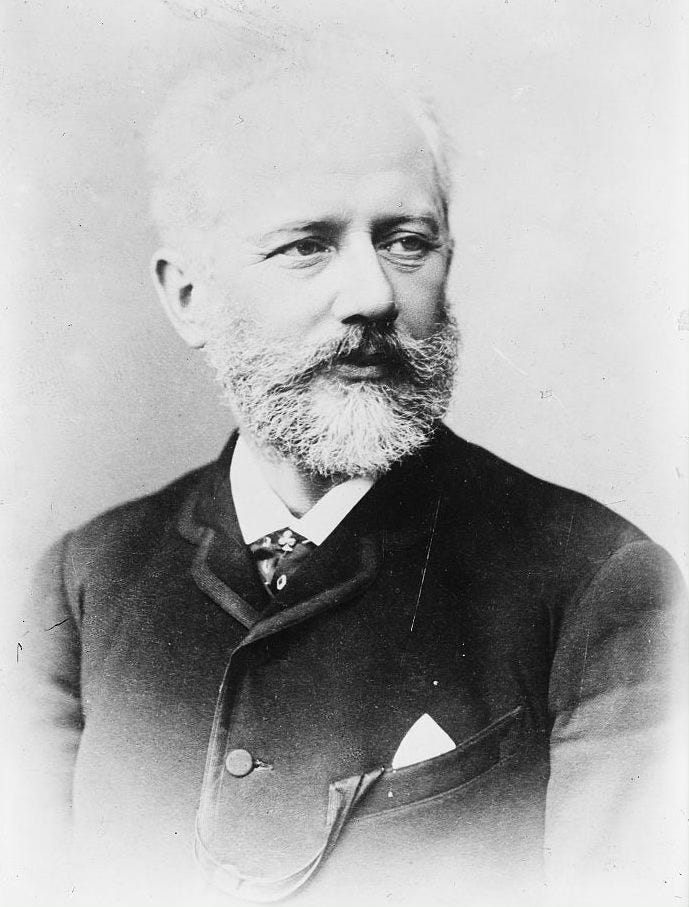Applications are now open for the 2025 J.M.K. Innovation Prize. Provided by our friends at the J.M. Kaplan Fund, the prize awards $175k for early-stage projects with transformative potential in the areas of heritage conservation, the environment, and social justice. Awardees receive unrestricted funding along with a cohort experience and a thoughtful community of support. Apply by April 25th!

A legion of artists, scientists, hucksters, and self-help gurus alike have tried to bind, bottle, smoke, snort, and invoke the Muse.
We yearn for the ability to snap our fingers and, Uber-style, have her arrive on our doorstep. Inspiration on Demand.
Pyotr Tchaikovsky, the great Russian composer, was no different. Inspiration — frustration at its absence, delight at its arrival, fury at its disappearance — was a recurring theme in the thousands of letters he wrote (compiled here).
If you’ve ever found yourself sitting at your computer, banging your head against the desk, don’t worry: it’s not just you. “Inspiration will not come; every day I begin something and lose heart,” he rants in one letter. “Then, instead of waiting for inspiration, I begin to be afraid less I am played out, with the result that I am thoroughly dissatisfied with myself.”
We’ve all been there.
Such was Tchaikovsky’s reverence for the Muse that he, at least once, thought it immoral to be paid in her absence. “A work such as you now wish me to undertake demands a certain degree of what is called inspiration, and at the present moment that is not at my disposal,” he writes to his wealthy patron, Nadezhda von Meck (parallels to The Brutalist abound). “I should be guilty of artistic dishonesty were I to abuse my technical skill and give you false coin in exchange for true.”
Note his reference to “technical skill.” Tchaikovsky repeatedly distinguished between two kinds of creativity: that which comes from craftsmanship and that which comes from inspiration.
They are not mutually exclusive. Inspiration alone is insufficient. An artist must possess the technical skill to refine it, to make it flesh. “Cool headwork and technical knowledge have to come to my aid,” he writes. “Even in the works of the greatest master we find such moments, when the organic sequence fails and a skilful join has to be made, so that the parts appear as a completely welded whole.”
Yet, while craft matters, works produced purely by technical ability will always be earthbound, workmanlike:
“The work created will always remain the mere product of labour, without any glow of genuine musical feeling."
While art brushed by the Muse is capable of transcendence:
“The only music capable of moving and touching us is that which flows from the depths of a composer’s soul when he is stirred by inspiration.”
If you’re reading this and thinking, “Great, I may as well shut the laptop, crack open a beer, and wait for some inspiration," I’m afraid Tchaikovsky has some bad news.
An artist must learn to create without inspiration. “We must always work, and a self-respecting artist must not fold his hands on the pretext that he is not in the mood,” he declares. “I consider it, however, the duty of an artist not to be conquered by circumstances.”
One cannot simply summon the Muse. Artists must master their “disinclination.” They must resist becoming “indolent and apathetic.” To give in is to preclude her arrival. To persist is to encourage it:
“A few days ago I told you I was working every day without any real inspiration. Had I given way to my disinclination, undoubtedly I should have drifted into a long period of idleness. But my patience and faith did not fail me, and to-day I felt that inexplicable glow of inspiration of which I told you; thanks to which I know beforehand that whatever I write to-day will have power to make an impression, and to touch the hearts of those who hear it.”
Where, then, does inspiration come from?
For Tchaikovsky, the answer lay within: “That which is unfamiliar to the human heart should never be the source of musical inspiration.”
And how does it come?
“Suddenly and unexpectedly. If the soil is ready — that is to say, if the disposition for work is there — it takes root with extraordinary force and rapidity, shoots up through the earth, puts forth branches, leaves, and, finally, blossoms.”
When inspiration strikes, his advice is clear: capitalize on it. Avoid interruption at all costs. Long before the era of the notification junkie, he laments the poisonous effect of life’s distractions. “Dreadful, indeed, are such interruptions,” he cries. “Sometimes they break the thread of inspiration for a considerable time, so that I have to seek it again—often in vain.”
If, though, you manage to stave off distraction and create hand-in-glove with the Muse, then the experience is akin to the sublime. “It would be vain to try to put into words that immeasurable sense of bliss which comes over me directly a new idea awakens in me and begins to assume a definite form,” he writes. “I forget everything and behave like a madman. Everything within me starts pulsing and quivering; hardly have I begun the sketch ere one thought follows another.”
And then… it’s gone. Whether interrupted or seen to its conclusion, inspiration dissolves as quickly as it materializes.
Though frustrating, this is for the best. No mind can endure a sustained connection with the source.
“If that condition of mind and soul, which we call inspiration, lasted long without intermission, no artist could survive it,” he warns. “The strings would break and the instrument be shattered into fragments.”
If you enjoyed this, check out last week’s installment: The Creativity Diaries #2: David Lynch

